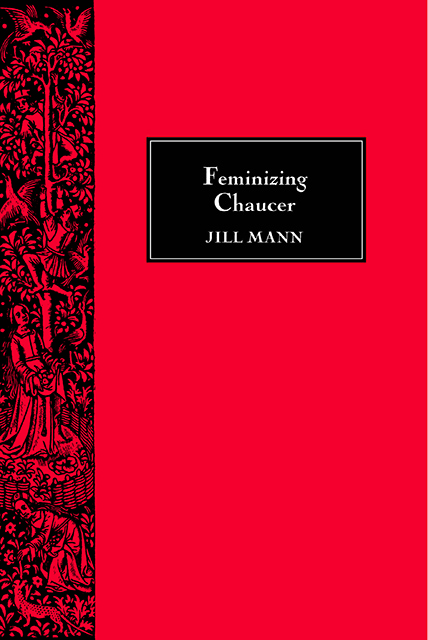Book contents
- Frontmatter
- Contents
- Dedication
- Preface to the 2002 Edition
- Preface
- Abbreviations
- Introduction
- 1 Women and Betrayal
- 2 Antifeminism
- 3 The Surrender of Maistrye
- 4 Suffering Woman, Suffering God
- 5 The Feminized Hero
- Conclusion
- Excursus: Wife-Swapping in Medieval Literature
- Chaucer Studies
- Bibliography
- Index
5 - The Feminized Hero
Published online by Cambridge University Press: 17 March 2023
- Frontmatter
- Contents
- Dedication
- Preface to the 2002 Edition
- Preface
- Abbreviations
- Introduction
- 1 Women and Betrayal
- 2 Antifeminism
- 3 The Surrender of Maistrye
- 4 Suffering Woman, Suffering God
- 5 The Feminized Hero
- Conclusion
- Excursus: Wife-Swapping in Medieval Literature
- Chaucer Studies
- Bibliography
- Index
Summary
‘… pitee renneth soone in gentil herte.’
(Knight's Tale 1761)It is nowadays a commonplace that the meaning of a term is not fixed in isolation, but only in relation to the cultural or linguistic structure of which it forms part. So the value assigned to ‘woman’ or ‘womanhood’ cannot be fully determined without reference to the values invested in the term ‘man’. To make ‘woman’ into a moral positive is not enough, if she becomes thereby merely the ‘silent bearer of ideology’, as Mary Jacobus puts it (1979, 10) – if, that is, her morality acts only as a salving conscience for the men who are left free to practise the realpolitik required for effective action in the world. The question of how Chaucer conceives of men is thus the last and most crucial element in determining the status of women in his writing.
Male heroes are, as I have already noted, few and far between in Chaucer. In the Canterbury Tales, the moral high ground is occupied by Constance, Griselda, Cecilia, Prudence, and no man is accorded the central and dominating position in the narrative that they enjoy. It is only in Troilus that a single male consciousness becomes the central locus of poetic meaning; whatever the prominence given to Criseyde, the central subject of this poem is the loss of happiness, and it is to Troilus and not to Criseyde that this experience belongs. The question raised by this experience – the question of what meaning can be attached to human happiness in a mutable world – has urgency only if we believe that it was a true happiness, and also that its loss cannot simply be written down to failings or vices – female fickleness, male inertia – which could be avoided by those wishing for better fortune. Chaucer takes pains, therefore, to present Troilus as admirable throughout; he is ‘this ilke noble knyght’ to the last (V 1752). In his final emotional rejection of human love, Chaucer still speaks, not of Troilus's weakness or folly, but of his ‘grete worthynesse’ and his ‘noblesse’ (V 1829, 1831). It is to Troilus that we should look first, therefore, for evidence of Chaucer's conception of a masculine ideal.
- Type
- Chapter
- Information
- Feminizing Chaucer , pp. 129 - 144Publisher: Boydell & BrewerPrint publication year: 2002

